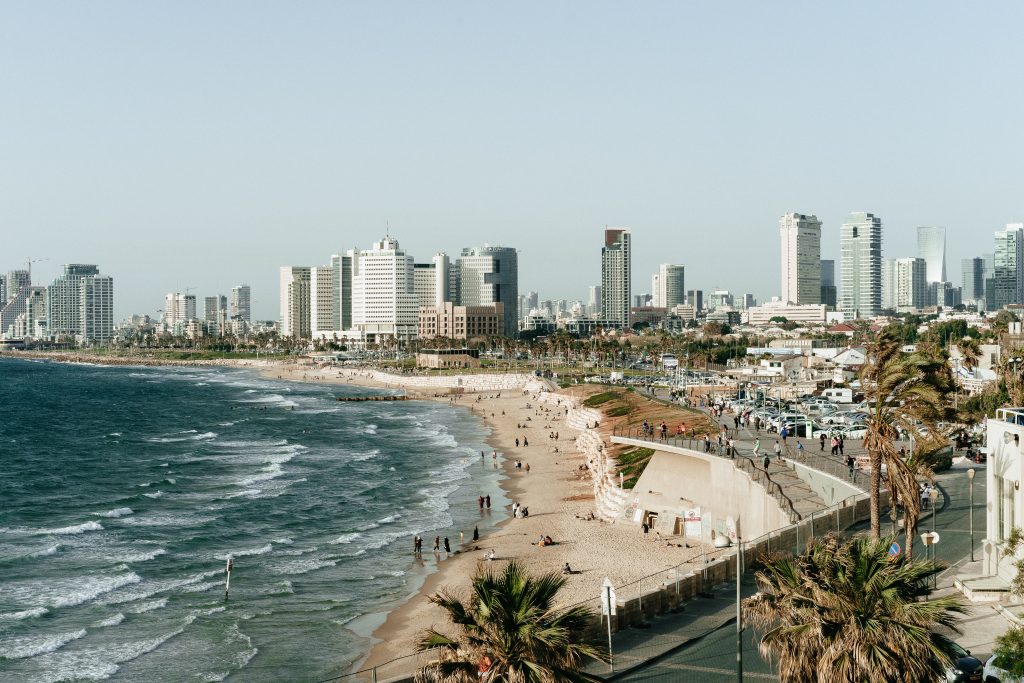
Key learnings from our mission to Israël, the Startup Nation
31 May 2023
From February 13 to 17, 2023, Naouel Hanani and I (Liette Lamonde) joined a trade mission organized by the Chamber of Commerce of Metropolitan Montréal to discover the Startup Nation, Israel. We report here on our impressions and learnings.
One week in Israel is a very short time to gain a true understanding of this internationally recognized innovation ecosystem. But sometimes, like the stars, human encounters align and, in addition to being good for the soul, provide us with a few insights and convictions.
Ah, the Mediterranean Sea!
First, the location. Tel Aviv is bordered by the Mediterranean Sea. 14 km of perfect beach made up of extra-fine blond sand, the sea as far as the eye can see. Here, you can meet up with family, friends, lovers, listen to music, drag your feet or run along the boardwalk. And when the time comes, let yourself be enveloped in the unique light of a dazzling sunset, with the fortifications of the thousand-year-old city of Jaffa on the left and the modern towers of Tel Aviv on the right. Did you say contrasts?
On the first two days of the mission, we attended several presentations, moving from meeting rooms with no natural light to event spaces with huge windowed walls overlooking the sea. Numerous speakers (chambers of commerce, government agencies, investors) fed us with statistics demonstrating Israel’s tremendous success, and with quantities of fresh fruit, dates, nuts and irresistible pastries…
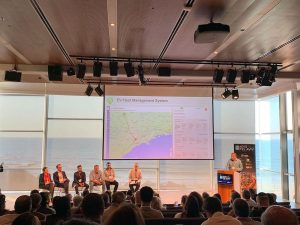
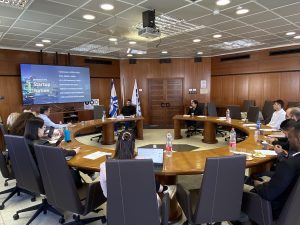
These presentations taught us all about Israel’s positioning as the Startup Nation:
- 7th in the world ranking of startup ecosystems
- 97 unicorns are born here
- The high-tech sector generates 54% of exports
- Between 6,500 and 9,000 Israeli startups (depending on who you talk to)
Success factors in the ecosystem
- Chutzpah”: Israeli audacity and extreme self-confidence
- Failure is accepted and even valued here
- The life course of young Israelis which includes military service, where they learn leadership skills at a very early age and take on major responsibilities. The army is also where you build a lifelong network and develop cutting-edge knowledge in elite units, or in technological and cyber-security units.
- The contribution of immigrants, particularly Russian engineers and mathematicians who arrived in large numbers when the USSR collapsed.
- Some 500 multinationals have set up research centers here.
- Privileged access to the American market thanks to relations with the large Jewish community
- A feeling of having nothing to lose and the need to innovate for geopolitical and food security.
Our parallel mission

You get a lot more out of a group trade mission when you plan to add one-on-one meetings in parallel. With FOMO in full swing, we took advantage of the convergence of the startup ecosystem at the Our crowd Global Investor Summit in Jerusalem to confirm an ambitious agenda of meetings. Our crowd is a formidable equity investment platform for startups, launched 10 years ago in Israel. It now has 200,000 members who invest from $10,000 to a minimum of $50,000. A total of $2 billion has been confirmed. The event brings together many of these investors and highlights startups seeking funding. On the corner of a table strategically located a stone’s throw from a buffet that a team was tirelessly replenishing, we sat in the middle of a changing crowd of hungry people. Ironically, we never had time to eat.
In the chaos and electrifying energy, we learned the following:
- The DNA of the population and the local culture largely determine its strength and differentiation.
- As an organization that supports startups in Quebec, we can draw inspiration from them and plan our own exit as soon as we design a new program, taking into account the evolution and maturity of the ecosystem.
- There are 190 accelerators, incubators and technology hubs.
- These have gradually turned their attention to more advanced startups, which have already raised up to $1 million.
- The City of Tel Aviv is launching new programs and services positioned at the pre-startup stage, as the early project pipeline is being neglected.
- Leading sectors are cyber-security, fintech, agri-tech and health sciences
- Strengths lie in B2B
- Sectors prioritized by the government are climate-tech and mobility
- Mutual support between entrepreneurs is one of the ecosystem’s greatest strengths, well ahead of collaboration between ecosystem players.
- Success is measured not by the number of jobs created or exports, but by the innovation created and the experience gained by co-founders.
On Thursday afternoon, a guide took us through thousands of years of history in Jerusalem’s Old City. Here, on the rooftops, as we gazed out over the Mount of Olives, went up the call to prayer from a nearby minaret. A passage through the labyrinth of the Old City leads to the al-Aqsa Mosque, another to the Church of the Holy Sepulchre. A few steps further on, we all find ourselves at the Western Wall (often mistakenly referred to as the Wailing Wall). It’s hard to convey to anyone who hasn’t experienced this tangle of alleyways inside the fortifications, where all these religions live side by side, or rather intertwine and intertwine.
Anatomy of a successful meeting
With the mission ending on Thursday evening, Naouel and I extended our stay to meet new people and do a little sightseeing. The information we had was that Shabbat begins at sunset on Friday and ends at sunset on Saturday but that it was not strictly observed in Tel Aviv. What we hadn’t been told until we’d sent emails requesting meetings in preparation for the mission and confirmed our flights, was that Friday and Saturday are off and we work on Sunday. So it’s hardly surprising that only one person agreed to meet us for lunch on Friday.
This very last business meeting couldn’t have been more perfect. Our contact was a university professor who arranged to meet us at a 2nd-floor café on a shopping street where an artisans’ market was taking place. We hesitated a little in the decrepit, graffiti-covered entrance before climbing the stairs leading to the source of the music echoing through the building. When we reached the top of the stairs, a bohemian café with mismatched furniture and a sun-drenched terrace immediately brought broad smiles to our faces and created an instant sense of well-being. Another table was set for a wonderful human encounter.
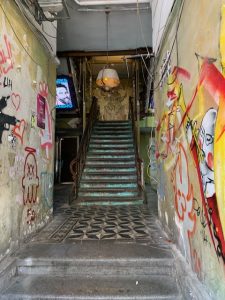
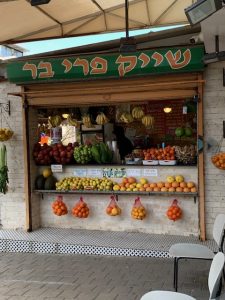
Our teacher confided that not everything was perfect:
- 90% of startups don’t succeed
- We’re very good at innovating, but less good at growing a business
- The local market and those of neighboring countries are insufficient, forcing exports that are not local.
- Startups relocate quickly to the U.S. and are bought too early
- We’re still awaiting the success of a major technology company born in Israel.
- Women head only 10% of startups
- Access to talent is a constant battle, given the strong presence of foreign R&D departments.
- Financing is not readily available at all stages of a startup’s development, which is why some startups have relocated to the United States.
If the table is important in local culture, it’s because sharing a meal gives time to talk. And to think that we often choose our lunchtime restaurants in downtown Montreal for their ability to serve food quickly.
Sunday morning, on the flight from Tel Aviv to Toronto, after walking the city the day before, photographing Bauhaus buildings and drinking freshly squeezed fruit juice, we compared notes, impressions and new memories.
From this pile of learning, we drew the following lessons:
- A startup ecosystem is first and foremost made up of human beings, and mutual support is at its core.
- If we want to be a company of innovators, we have to value risk-taking, accept failure and measure success differently from the way we do.
- A common discourse among all players when talking about our startup ecosystem and its strengths is essential to a strong positioning.
Direct and generous exchanges… with our mouths full!
These meetings, usually with our mouths full, were essential to the success of our mission. In the space of a week, we were able to taste and experience the Israeli ecosystem.
Everyone shared with us their pride in being part of and having built the Startup Nation. Everyone generously shared the best of this ecosystem with us.
We came away with the impression of having grown and understood something.
- Firstly, that every ecosystem is rooted in the history of its country and the personality of its people.
- Secondly, that its own characteristics are its foundation.
- And finally, that the mutual support and relationships forged on this basis are a powerful bond that carries us far beyond our borders.